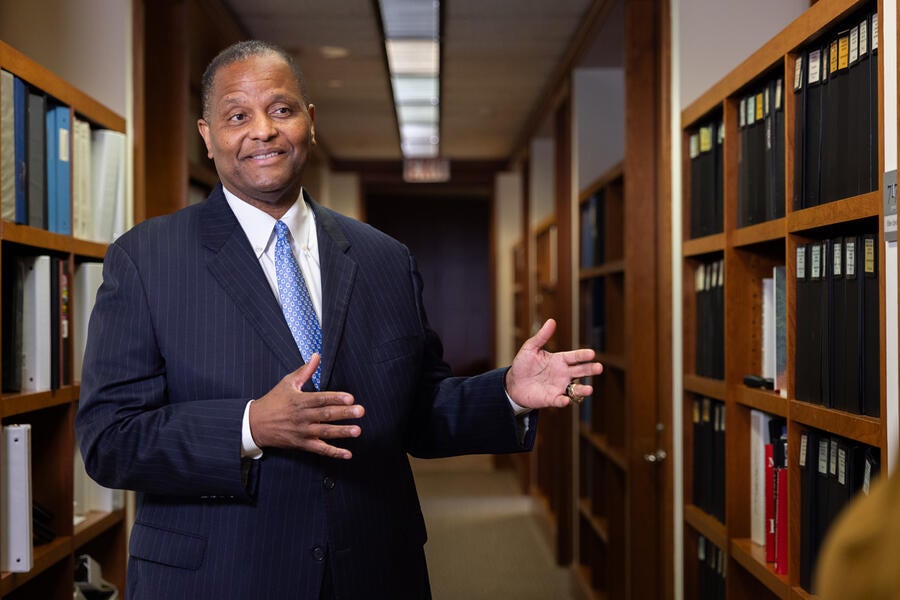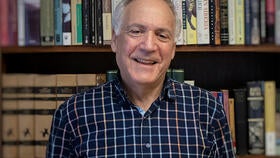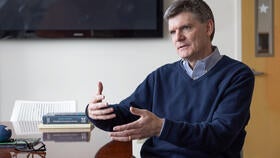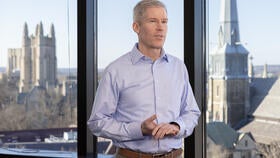
J. Mike Bellamy was appointed vice president for facilities, campus development, and sustainability in October 2022. He arrived at Yale from the Kaiser Foundation Health Plan where, as executive director of facilities services, he directed environmental management; property management; real estate; facilities operations; facilities planning, design, and construction; and coordinated security, clinical technology, and biomedical engineering services for the care-delivery system serving more than 800,000 health plan members in Virginia, Maryland, and Washington, D.C.
Bellamy earned a Bachelor of Science degree in civil engineering from the Virginia Military Institute (VMI), where he played Division I football as a safety. He has a Master of Science degree in building construction management from Purdue University, and he is a registered Professional Engineer in the Commonwealth of Virginia. Bellamy also served in the U.S. Army Reserve as a combat engineer and infantry officer in command and staff roles for more than a decade. He and his wife, Kim, reside in New Haven and are the parents of three grown children.
YourYale sat down with Bellamy to discuss his work at Yale and his perspectives on leadership. This interview has been lightly edited.
How do you view the work of Facilities within the university?
The scale and complexity of the 24/7 facilities operations at Yale is immense. Our team is comprised of nearly 1,000 dedicated people who maintain and operate approximately 22 million gross square feet of space and approximately 1,000 acres of land in the New Haven area.
I am always thinking about how Facilities can make the greatest impact in its service and support of the university.
Given the scope of our work, I am always thinking about how Facilities can make the greatest impact in its service and support of the university. The two primary ways to do that are to operate as one team and through effective leadership. We must be integrated in our thinking, then in our behavior, and ultimately, in the services we deliver. We must be highly collaborative and understand that whether someone is working in planning, design, construction, finance and administration, sustainability, facilities operations, custodial services, grounds, or communications, we are one team going forward. The university is counting on us to deliver efficient and effective facilities services, so we are going to do everything possible to follow through on that mandate.
We want to lead by example. Because of the great support provided by the president and university cabinet, I feel empowered in my role, and as facilities leaders, we need to do the same with our people. It is our job to get them what they need, to remove obstacles, and support them.
As you consider the wealth of knowledge and experience you have gained over the course of your career, what would you consider an area that you intend to focus on for facilities?
My focus for Facilities is expansive and sets the tone for our future. Key to everyone’s success at Yale is delivering the $4 billion multiyear capital program required to advance the university’s academic priorities and providing effective 24/7 facilities operations support. We need to effectively plan, build, and maintain spaces across all campuses where teaching and research can be conducted at the highest level.
Tied to capital is operationalizing Yale’s Sustainability Plan and facilities and infrastructure resiliency strategies. This work is directly tied to the objectives outlined in the University Initiatives, particularly in the area of Planetary Solutions. Yale was one of the first universities to set greenhouse-gas reduction goals (in 2005), and Yale’s commitment to its built environment spans more than 30 projects with a silver, gold, or platinum LEED certification. For the university to achieve its climate goal of net zero emissions by 2035 and produce zero actual emissions by 2050, we continue to make significant investments in the built environment and modes of operation that lead in the sustainability space.
One such goal on our operations side is to become data-driven through technology optimization. Referring to Jack Callahan Jr.’s guidance to “do something different,” we are developing systems that will better serve our teams’ and our clients’ needs. We will also improve our integrated facilities service delivery by rethinking our service-level agreements. We need to make sure service levels are aligned with our budget and people count.
This work cannot be done without talented and dedicated staff. My “one team, forward, together” approach is evolving our Facilities culture. We are building a more cohesive leadership team and empowering others to participate more readily and with more frequency. Good ideas can come from anywhere, and I welcome them from across our team.
When faced with adversity on the job, what is your first action?
My first action is to listen. I try not to go directly to a solution that has been successful in the past because each organization and situation is different. I explore other ways of looking at the problem. I may have something formulated in my mind, but it’s important to ask my colleagues: “What do you think we need to do?”
Even though you might be faced with adversity and under a lot of pressure, you have to stay calm. I credit playing sports and my military training for teaching me how to stay calm under pressure. I remember that one of my evaluations in the military read, “this officer brings calmness to very chaotic situations.”
What has helped you develop as a leader?
Sports were a big part of my life, and I played football and ran track in high school and at the collegiate level. I was trained on the importance of values and how to clearly articulate them to others during my time in the Army as a combat engineer and infantry officer. Those values become embodied in an organization through leading by example.
Working internationally played a significant role in learning how to navigate different circumstances, being adaptable, and appreciating culture, diversity, and varied points of view. Those were very formative experiences for me, especially during my time in Italy. As I look back over my 43-year career, every position I have had has prepared me for this job at Yale. Staying curious has also helped me to continue to develop as a leader.
What leaders do you admire?
I have worked with many exceptional leaders throughout my career; you learn by being around them. Lonnie Bunch, the founder of the National Museum for African American History and Culture—which cost $500 million to build—and a Yale honorary degree recipient, was a phenomenal leader to watch when we worked together at the Smithsonian Institution.
As I look back over my 43-year career, every position I have had has prepared me for this job at Yale. Staying curious has also helped me to continue to develop as a leader.
Gary Mackey, a mentor of mine, played a key role in my career as a young civil engineer coming out of college. Like me, Gary was a scholarship football player at VMI, and he graduated with a degree in civil engineering. Gary helped me do the right things to remain competitive as I progressed professionally, all while he led construction operations at the Naval Facilities Engineering Command’s Atlantic Division, whose area of responsibility spans the east coast of the United States, the Caribbean, Central America, Europe, Africa, and the United Arab Emirates.
It is astounding how many people Gary has helped professionally who went on to be leaders across this industry. Because of his guidance, wherever I went, I felt I had a duty to take a genuine interest in people’s careers. People I have known for over 20 years still reach out to discuss professional and personal issues. I wouldn’t be here today if it wasn’t for a host of great mentor-leaders like Gary Mackey, and I still talk with him every two to three months.
Like many Yale leaders, you have multiple degrees. What keeps you motivated?
I am very curious and love to learn. My mom encouraged me to fall in love with reading and to get a master’s degree. I set my career in five-year increments, and since I wanted to move up in my line of business, I studied different skills and competencies and received executive training. Gary Mackey advised that I needed to become a licensed engineer, and then get a master’s degree. I completed my master’s from Purdue while I was working and when all my children were in college. It was the right time because I had fewer parental responsibilities.
Right now, I am almost finished with an MBA. I have three more classes, and I will have that degree from the University of Iowa. After I have finished this master’s, I’ll probably go get another because I enjoy expanding my skills so much.
What keeps you balanced?
A big part of keeping balanced is my relationship with my wife, Kim. We have been married for 41 years. She and I like going to the gym together and taking walks. We enjoy traveling internationally, and prior to the pandemic, we were flying to Europe nearly every year to reconnect with friends and return to countries we had visited. I also try to disconnect over the weekends, barring any emergency.






